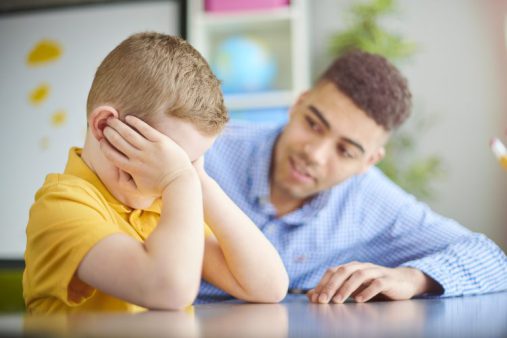Mastering mental health literacy
By Annie Slease

Every day in my classroom, Gary fell asleep, and Miranda and Cameron went to the nurse; Cameron, to report his ever-changing mystery symptoms that only peppermints could quell, and Miranda, at noon, for her pill. Drew picked out his eyebrows one at a time, and by winter break, he’d moved on to his lashes. Charles chattered nonstop, eager to share what he’d read or learned or wondered; but then, he would suddenly burst into tears, inconsolable, and was chronically misunderstood by his peers. Emily trembled on book report days. And Maria never uttered a single word all year long.*
These are the students from my early years of teaching that I still worry about 30 years later. They didn’t have the words to explain what they needed, their grownups didn’t have the awareness to recognize the signs, and I didn’t have the training to know how to help them.
None of us had mental health literacy, a concept that includes understanding mental health conditions, their symptoms and treatments, and leads to decreasing stigma, fostering more positive self-care, and developing help-seeking behaviors.
Only years later, after the onset of my own child’s mental illness, did I learn that mental health conditions are common, affecting 1 in 5 in any given year, and begin early with 50 percent of lifetime conditions presenting by age 14. I’d discover that what kept my family afraid and ashamed had a name: stigma, which is the primary reason that most people never seek help, and if they do, they wait an average of 11 years. In my child’s case, his unmet needs led to addiction, homelessness, and prison before he turned 21. And I learned that our story was common. People with untreated mental illness have increased risk for academic failure, unemployment, other chronic disease, homelessness, substance misuse, incarceration, and suicide, the second leading cause of death for youth ages 10 to 24.
School-focused policies are vital to improving outcomes because when mental health symptoms are addressed early and comprehensively, recovery is not only possible, it’s likely. In Delaware, those policies increasingly have been gaining a foothold, and if HB 301 passes this legislative session and becomes law, K-12 curriculum will include mental health. Delaware would be following the lead of New York, which in 2018 passed the first-of-its-kind legislation requiring elementary, middle and high schools to include mental health as part of existing health instruction. Today, 18 states have similar requirements.
The First State is well positioned to make mental health required instruction. Recent work with the Collaborative for Academic, Social, and Emotional Learning (CASEL) offers foundational support. Last year Governor Carney signed HB 100, bringing more counselors, psychologists, and social workers into elementary schools. And this year, if it passes, HB 300 would bring the same workforce boost to middle schools. But for a K-12 mental health literacy bill to make a difference in Delaware, it must be more than just another education mandate.
To effectively teach mental health literacy, we must first master it ourselves. Understanding the facts, acknowledging the stigma, and embracing help-seeking and self-care practices must begin with our education leaders. To do this, our educators need support. They need time. And they need to feel valued. The self-care and help-seeking behaviors included in mental health literacy must be prioritized by them, but also for them. This means administrators must embrace these concepts, too. All education professionals should experience the benefits of positive mental health through their own literacy and shouldn’t feel burdened doing so. They need incentive to develop this expertise. That could come with micro-credentials in mental health training, increases in compensation for educators with that training, and Youth Mental Health First Aid as part of student-teacher preparation.
Developing the teaching materials mustn’t be a burden on educators either. We should look to states like New York and their comprehensive guide. And we should establish program workgroups with educators, school mental health professionals, community mental health educators and clinicians, and with young adults and family members who have personal experiences to share. The workgroups should support program development but also help monitor outcomes, and build online resource libraries for educators, parents, youth and community members. Together, we can shape Delaware’s understanding of mental health and embrace the possibilities of enhanced community wellbeing.
There is one more student I think of often, Aaron. He was charming, funny and insightful. He was the kind of student every teacher loves to have. If only mental health literacy had been included in his education beginning in kindergarten and continuing through grade 12, the outcome for him might have been different. He, his peers, and his teachers would have long understood that mental health is health. Mental illness is common, treatable, and nothing to be ashamed of. And asking for help is not a sign of weakness; it’s a demonstration of strength.
At the age of 20, Aaron died by suicide.
Delaware students deserve mental health literacy. We all do. But let’s be sure we create real change and not just another education mandate.
*The author changed the names of students mentioned in her blog post to safeguard their privacy and the privacy of their families.
Categories:mental health.

